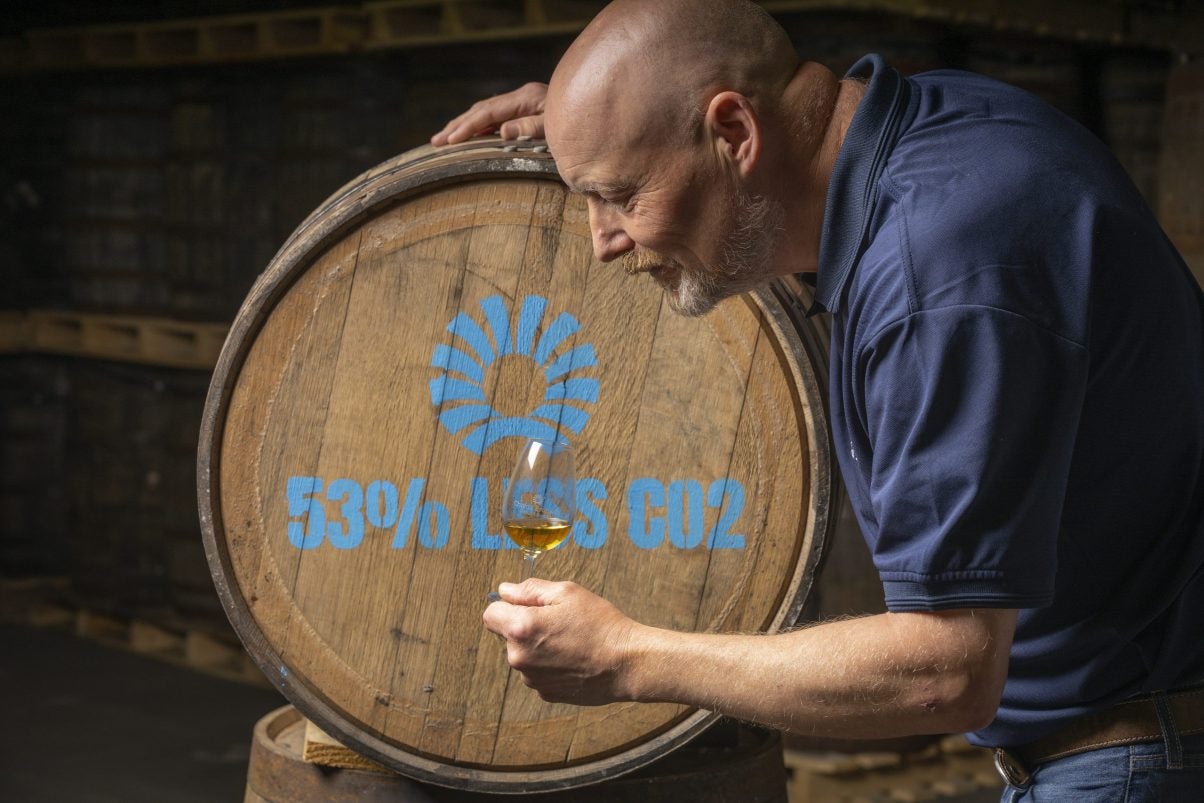The Scotch whisky producer has deployed highly efficient heat recovery technologies within the whisky distillation process, halving carbon emissions at its Glentauchers distillery
Chivas Brothers, the Scotch whisky business of Pernod Ricard and maker of global Scotch whisky brands including Chivas Regal and The Glenlivet, has today made the expertise and learnings from its successful integration of enhanced heat recovery technologies ‘open source’. The move was made after the application of the technology at its Glentauchers site showed significant benefit in carbon emissions reduction, providing insights that will benefit the industry at large if adopted at other suitable distillation sites.
The sharing of its design process and implementation insights is intended to put collaboration ahead of competition on the road to net zero, rooted in the belief that distillers must work together to create a sustainable future for Scotch, Scotland’s largest export.
The heat recovery technologies, including Mechanical Vapour Recompression (MVR) and Thermo Vapour Recompression (TVR), are designed to capture and recycle heat generated in the distillation process that would otherwise go to waste.
To date, these have reduced total energy consumption almost by half (48%) at Chivas Brothers’ Glentauchers distillery, near Keith in Speyside, Scotland, reducing the site’s total carbon emissions by 53% as a result. This represents an energy saving equivalent to powering 4,979 average UK homes1 – more than all the houses in Keith2 – for an entire year.
The business’ ambitious plans to roll out these integrations across all viable sites is part of a drive to achieve carbon neutral distillation by the end of 2026. Chivas Brothers expects these technologies to reduce its overall energy consumption and carbon emissions in distillation by one third, which is more than 30,000 tonnes of CO2 per annum, or the equivalent of 67,226 UK homes.
While not suitable for application in every distillery, Chivas Brothers estimates that if these technologies were applied by the wider industry’s malt distilleries alone, this could equate to a saving of some 1,756Gwh per year – enough to power 605,000 average homes for a year1, more than the number in Edinburgh and Aberdeen2 combined.
Commenting on the ‘open source’ move, Jean-Etienne Gourgues, Chairman and CEO of Chivas Brothers, said:
“Heat recovery forms a critical part of our commitment to achieve carbon neutral distillation by 2026. Findings with such significant impact must be shared; this technology has the potential to transform our industry and accelerate its progress to net zero.
“That’s why today we’re making our design process and implementation learnings available to all”, he continued. “As a business with a long history of innovation, we believe this is the right thing to do. Collaboration across our industry will be fundamental if we are to meet collective ambitions around sustainability, safeguarding the long-term future of our product and our planet. Understandably, this technology won’t be right for every distillery, but we encourage our peers to explore whether it has the potential to reduce their own carbon output.”
A case study has been published by Chivas Brothers, outlining the benefits and savings achieved, plus additional detail on the basis of design used. The business will also host a series of dedicated open house events at its Glentauchers site, creating an opportunity for other distillers to see the technology, how it has been integrated and facilitate industry learning, while aiming to demystify some of the recurring hurdles around the implementation of these technologies.
The company’s recent successes in heat recovery are a continuation of its 2021 pilot programme, which achieved energy reductions of 88% on a single pot still and showcased the potential if adopted across distillery operations. The pilot programme at Glentauchers was part-funded by the Scottish Government through the Scottish Industrial Energy Transformation Fund, which aims to support decarbonisation and energy efficiency in Scotland’s industries.
Scottish Government Energy Minister, Gillian Martin, said:
“Chivas Brothers has led the way with an innovative approach which has halved energy consumption at their Glentauchers distillery. Sharing this breakthrough with the wider whisky industry has the potential to advance efforts to reach net zero across the sector.
“Recycling heat from malt that would be the equivalent of powering all the homes in Edinburgh and Aberdeen could be a game changer for the industry, and a boost to Scotland’s economic growth while helping reach our climate change goals.”
The successes of this programme are shared with the company’s supplier, Piller Blowers & Compressors GmbH, manufacturers of high-performance blowers and compressors for the process industry, whose team worked alongside Chivas Brothers to adapt its technology for distillery applications. As a result, the technology achieved a Co-efficient of Performance of 12, meaning for every 1 kwh of electricity input, 12 units of heat were generated. This level of performance is essential if the technology is to make a meaningful contribution to carbon reduction, while also delivering cost-effective improvement in energy efficiency.
The case study and basis of design will be available for download via https://www.chivasbrothers.com/sustainability/open-source/
Registrations of interest to attend the Open House sessions can be lodged via https://www.chivasbrothers.com/sustainability/open-source/
Disclaimer: Each distillery requires a bespoke heat recovery solution that is fit for purpose for its size and layout. The information provided in this document has been compiled internally by Chivas Brothers Limited and reflects the successful installation at Glentauchers. This information is provided in good faith; however, it is the responsibility of the system designer to ensure that their particular installation suits their specific site and equipment layout. Results from any installation may differ from those achieved by Chivas Brothers Limited.


